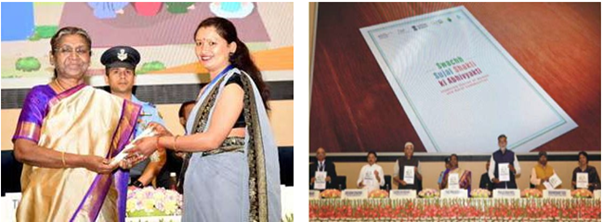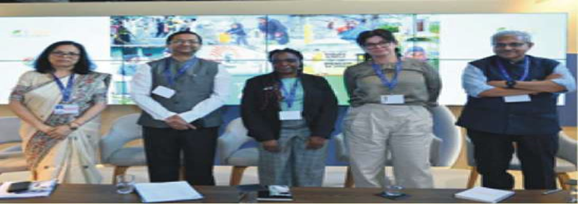Ministry of Jal Shakti

Year End Review of Department of Drinking Water And Sanitation, Ministry of Jal Shakti
Jal Jeevan Mission Crosses Several Milestones In 2023 From 11 Crore Rural Household Tap Connections In January, 2023 To Nearly 14 Crore Tap Connection In December, 2023
President Of India Confers ‘Swachh Sujal Shakti Samman’ 2023 To 36 Women WASH Champions
In 2023-24, Gross Budgetary Support Of Rs 70,000 Crore For Implementation Of Jal Jeevan Mission
90% Villages In India Declared ODF Plus Under Swachh Bharat Mission – Grameen (As On 3rd January, 2024)
400% Surge In ODF Plus Villages, From 1 Lakh Villages In December 2022 To Over 5 Lakh ODF Plus Villages In December 2023
Swachhata Hi Seva campaign from 15th September, 2023 to 2nd October, 2023 receives mass participation from over 109 crore people, with 53 Crore people undertaking 'Shramdaan For Swachhata', averaging 3 crore daily participations
Posted On: 05 JAN 2024 6:12PM by PIB Delhi
The Department of Drinking Water and Sanitation, Ministry of Jal Shakti has been working relentlessly towards achieving the vision and mission of making a ‘Swachh Sujal’ nation as envisioned by Prime Minister, Shri Narendra Modi. The flagship schemes of the department include Jal Jeevan Mission (JJM), which aims to provide safe and adequate drinking water through individual household tap connections to all households in rural India and Swachh Bharat Mission Grameen (SBM-G) which aims to continue universal sanitation coverage across the nation, ensure that the open defecation free behaviors are sustained, no one is left behind, and focus on providing interventions for safe management of solid and liquid waste in villages along with visual cleanliness.
During the year 2023, the Department of Drinking Water and Sanitation has undertaken several new initiatives and achieved significant outcomes/milestones under both the Jal Jeevan Mission and Swachh Bharat Mission - Grameen. Following are some of the key achievements of the Department in 2023:
- Jal Jeevan Mission
Jal Jeevan Mission, launched by Prime Minister Shri Narendra Modi in August 2019, is a transformative initiative dedicated to providing safe and ample drinking water to all rural households. Over the past four years, this mission has achieved a significant milestone, reaching 13.91 crore households with tap water connections and profoundly impacting rural communities. In 2023, the mission crossed several milestones and progressed from 11 crore connection at the start of the year to nearly 14 crore tap connections by the end of the year. In 2023-24, so far, the Government of India has released Rs. 45,841.39 Crore to 26 eligible States for the implementation of Jal Jeevan Mission in the financial year 2023-24.

Through a comprehensive approach, JJM has become a catalyst for positive change in the lives of millions across India's rural landscape. The Mission extends its impact to health and hygiene. The World Health Organisation released a groundbreaking report in June 2023 highlighting the substantial benefits of the 'Har Ghar Jal' program in India. The report estimates that ensuring safely managed drinking water for all households in the country could avert nearly 400,000 deaths caused by diarrheal diseases and prevent approximately 14 million Disability Adjusted Life Years (DALYs) related to these diseases. This achievement alone would result in estimated cost savings of up to $101 billion. The analysis focuses on diarrheal diseases as it accounts for majority of WASH-attributable disease burden. The study brought out the fact that Government of India’s investment in Jal Jeevan Mission has a significant multiplier effect on health.
Apart from health benefits, JJM also has massive potential for employment generation at the grassroot level. A study by IIM Bangalore, released on 11th August 2023 assessed the employment generation potential of Jal Jeevan Mission at 2.8 crore person-years in construction phase and 11.8 lakh person-years annually for operation & maintenance.
Status of Water Quality Monitoring and Surveillance
Ensuring water quality is one of the main objectives of the Jal Jeevan Mission. To ensure that the supplied water is of adequate quality, the program promotes regular testing of water samples at source and delivery points. There are a total of 2,113 water testing laboratories in the country. Of these, 1,381 are NABL accredited. Water quality testing labs of States/ UTs are now open for the public for testing water samples at nominal rates. In 2023-24, as of date, more than 54 lakh water samples have been tested in laboratories.
To promote women participation, at least five women in every village are being trained to use Field Test Kits (FTKs) for testing water quality at the village level. So far, more than 23.50 Lakh women have been trained in 4.97 lakh villages. During the FY 2023-24 as on date, more than 88 Lakhs water samples have been tested using Field Test Kits (FTKs).
Coverage of potable tap water to JE-AES affected districts
The government of India accords priority to Japanese Encephalitis (JE)-Acute Encephalitis Syndrome (AES) affected Districts to ensure potable tap water supply in all the households under Jal Jeevan Mission. In 61 districts affected with JE/AES across 5 states, tap water connection increased from 8 lakh (2.71%) to 2.09 crore (70.82%) households, resulting in improvement in the health profile of the rural population of these areas. Moreover, as on 20th July 2023, Safe drinking water has been provided in all arsenic and fluoride affected habitations under Jal Jeevan Mission. 14,020 Arsenic-affected habitations and 7,996 Fluoride affected habitations were reported by states/UTs as on 1st August 2019. As reported by States/UTs, as on 20th July 2023safe drinking water has been made available in all such habitations.
Click Here to Read More about Jal Jeevan Mission
- Swachh Bharat Mission – Grameen
SBM(G), a centrally sponsored scheme, launched by Prime Minister, Shri Narendra Modi on 2nd October, 2014, with an aim to make the country Open Defecation Free (ODF) by 2nd October, 2019, the 150th birth anniversary of Mahatma Gandhi, by providing access to toilets to all the rural households in the country. As a result, by October 2019, all villages across the country, and consequently all 36 States/UTs, had declared themselves ODF and rural sanitation coverage increased from 39 percent in 2014 to 100 percent in 2019.
Having achieved the outcome of ODF, Phase-II of SBM (G) was launched in 2020 to ensure that no one is left behind in their pursuit for having Individual Household Toilets and proper waste management systems, making villages ODF Plus Model.
Rural WASH Partners' Forum:
DDWS set up the Rural WASH Partners' Forum (RWPF), where development partners along with sector partners can come forward, support, and work collaboratively with the Gol, State/ UTs for the effective implementation of SBM-G.
Union Minister of Jal Shakti, Shri Gajendra Singh Shekhawat, released a compendium of 75 ODF Plus Best Practices, at the two-day National Conference held at Vigyan Bhawan on 21st and 22nd July, 2023.The compendium, titled Swachhata Chronicles: Transformative Tales from India,
showcased innovations, measures taken to overcome barriers and raise awareness, special campaigns launched, and other endeavors of States/UTs as a part of their ODF Plus activities to meet the goals of SBM-G Phase-II. The book is intended to promote cross-learning.
A round table conference with CEOs of RWPF was chaired by Joint Secretary & Mission Director, SBM-G on 22nd December, 2023, in New Delhi. The discussion focused on identifying ways of collaborating better for enhanced impact.
GOBARdhan:
GOBARdhan is an important initiative of Phase 11 of SBM-G. The objective is to generate wealth and energy by converting bio-waste including animal waste, agri-residue into bio-slurry and biogas, reduce emission of methane gas and contribute towards circular economy thereby improving the lives of rural communities. The initiative involves various stakeholder Departments/ Ministries which provide an enabling environment for Biogas/ Compressed Biagas (CBG) sector. As on date, 1150 biogas plants have been registered and more than 600 community/cluster level Biagas Plants are functional.
Swachhata Samachar:
The monthly newsletter of SBM-G viz "Swachhata Samachar" was launched in August 2022. In 2023, 12 newsletters have been published on the SBM-G portal. The newsletter is a comprehensive repository, offering insights into the various initiatives, projects, and achievements at both state and national levels. It includes details of state best practices, innovations, policy updates, and events. It plays a vital role in disseminating information about sanitation and cleanliness efforts, cross learning opportunities and thereby contributing to the overall success of the SBM-G.
Swachh Sujal Shakti Samman:

The 'Swachh Sujal Shakti Samman 2023' ceremony was held on 4th March at the Vigyan Bhawan as a run-up to International Women's Day. Organized by the Ministry of Jal Shakti, the event was graced by Union Minister of Jal Shakti, Sh. Gajendra Singh Shekhawat, Sh. Devusinh Jesingbhai Chauhan, Minister of State for Communications, Sh. Prahlad Singh Patel, Minister of State for Jal Shakti, Food Processing Industry; Sh. Bishweswar Tudu, Minister of State for Jal Shakti, Tribal Affairs; and Smt. Vini Mahajan, Secretary, DOWS. The President of India, Smt. Droupadi Murmu presented awards to 18 women champions and exemplary workers from the rural sanitation sector, recognizing their contributions to SBM-G. A total of 36 awards were conferred under SBM-G, Jal Jeevan Mission (JJM) and National Water Mission (NWM). Union Minister also presented The President with the first copy of the 'Swachh Sujal Shakti Ki Abhivyakti' - a compendium of case stories from SBM (G), JJM and NWM. A customized 'My Stamp' for NWM was launched by Minister of State for Communications Sh. Devusinh Jesingbhai Chauhan, who also presented the first copy to The President.
Exhibition at Bharat Parv & Dr. Ambedkar International Centre
Collaborations: As part of the 2023 Republic Day Celebrations, DOWS, participated in the six-day mega event Bharat Parv organized by the Ministry of Tourism in the lawns and Gyan Path in front of Red Fort, Delhi from 26th to 31st January 2023. The DOWS pagoda displayed achievements of SBM Phase I and 11 and was inaugurated by safai karamcharis, with a view to honoring and appreciating their efforts.
Secretary, DOWS, Smt. Vini Mahajan, chaired a session on 'Achieving ODF Plus Villages & Drinking Water facilities' in the Consultative meeting held with Aspirational Districts & Blocks
organized by NITI Aayog at Dr. Ambedkar International Centre, New Delhi on 29th April, 2023. This meeting allowed for a thorough review of SBM-G and JJM progress in aspirational districts & blocks.
SBM-G, G20 (Gandhinagar)
SBM-G was represented at the G20 meeting in Gandhinagar during the 2nd Environment and Climate Sustainability Working Group on 2nd – 29th March, 2023. The event was attended by more than 130 delegates from G20 member countries, Invitee countries, and International Organizations.
COP 28 - Women and Water:
The 'Women and Water' theme at COP 28 in the UAE (30th November-12th December, 2023) featured a presentation by JS & MD (SBM-G), DOWS, showcasing achievements under SBM-G and JJM. The event focused on WASH issues, emphasizing the impact of these flagship programs on women's lives in India.
SBM-G and the Ministry of Railways launched the Pani Ki Rail initiative on 14th September, 2023, flagged off by Vice President Shri Jagdeep Dhankhar. Himsagar Express and Kamakhya Express serve as mobile billboards to promote awareness on SBM-G, JJM, water conservation, river rejuvenation, and more.

Swachhata Hi Seva {SHS):
Swachhata Hi Seva (SHS) campaign was launched by Hon'ble PM in 2017 and since then, it is organized every year from 15th September- 2nd October. This year, the theme was Garbage-Free India and over 109 crore people participated in 'Swachhata Hi Seva' Jan Andolan across the nation. 53 Crore people undertook 'Shramdaan for Swachhata', averaging 3 Crore daily participations. The 18 days campaign showed remarkable results - cleaning of nearly 7,611 beaches, revitalizing 6,371 riverbanks and waterfronts, reclaiming over 15,576 legacy waste sites, improving 3,620 tourist and iconic destinations, and restoring over 1,23,840 public spaces. Additionally, over 16,000 water bodies were cleaned, over 87,000 institutional buildings rejuvenated, and nearly 66,779 garbage vulnerable sites cleaned. The MoHUA launched the Indian Sanitation League 2.0, an inter-city competition led by youth towards building Garbage Free Cities. SHS received participation from 71 Ministries and Departments of GOI, mmunities and the Government towards highlighted the unwavering commitment of sanitation and cleanliness.
Ek Tareekh Ek Ghanta Ek Saath:
As a run up to Gandhi Jayanti, a unique call to action was given by the PM to fellow citizens on the 105th episode of Mann Ki Baat, where he appealed for 1 hour of shramdaan for swachhata at 10 am on 1st Oct by all citizens collectively which will be a 'swachhanjali' to Bapu on the eve of his Jayanti. This appeal ensured collaboration across all departments including SBM- Rural and Urban. The M/o Tourism launched Travel for LiFE for Cleanliness Campaign at 108 selected sites, M/o Information & Broadcasting played the SHS video on all cinema screens across the country, Department of Telecom played the SHS ringtone across all mobile networks. The Department of Civil Aviation and Railway Board endorsed the SHS campaign in all the airports and railway ares while the ASI lit up all major monuments with the SHS branding. The Department of School Education & Literacy ensured sanitation activities to all public and private schools of the country and the Department of Higher education encouraged colleges and universities to spread the Swachhata message. All departments endorsed and contributed to the SHS campaign witnessing P articipation from 8.75 crore people (across urban and rural populations) with over 9.2 lakh events conducted across the nation.
Sujlam campaign:
Sujlam 1,2 & 3 campaigns have been launched by DOWS from 2021-2023 to enable states/UTs to carry out various activities for the promotion of grey water management systems. Across the years (2021-2023), the implementation has been consistently high with over 1 million soak pits being created annually, totaling to 5 million soak pits over the course of three years that have made an enormous impact.
Retrofit to Twin Pit Abhiyan:
Retrofit to Twin Pit Abhiyan was launched by Union Minister of Jal Shakti in 2022 to promote the safe disposal official sludge through a simple on site methodology of retrofitting single pit toilet to twin pit toilet. States/UTs have since taken necessary action to promote the construction of only twin pit toilets in the new IHHLs guidelines of SBM-G Phase II and the Faecal Sludge Management (FSM) Manual. Based on the baseline assessments of 2022, 1 million toilets have retrofitted during the Twin Pit Abhiyan (Oct 2022-Jun 2023)
Programme Funding under SBM (G) Phase-II
Under SBM(G), incentive of Rs.12000/- is provided for construction of individual household latrine (IHHL) to the eligible household ds the BPL household ds and identified Above Poverty Line (APL) household ds (SC/ST, Small and Marginal Farmers, Landless Labourers with Homestead, Physically Handicapped, and Women headed households)]. States have the flexibility to provide higher incentive amount by providing additional State share. Under the programme, financial assistance is a so provided to the Gram Panchayats for construction of Community Sanitary Complexes (CSCs) and creation of assets for SLWM in villages.
The fund sharing ratio between the Centre and the States is as under:
• 90:10 for 8 North Eastern States and 3 Himalayan States/UTs of Uttarakhand, Himachal Pradesh and Jammu & Kashmir
• 60:40 for other States
• For other UTs, 100% share is borne by the Centre
SBM(G) Phase-II components:
• Construction of IHHLs for any left out or newly emerged households
• Construction of CSC in villages on need basis
• SLWM - organic waste management, plastic waste management, greywater management and faecal sludge management Information, Education and Communication (IEC) and Capacity Building
The ODF Plus progress is being captured in three categories:
I. Aspiring: The village which is sustaining its ODF status, and has arrangements for Solid Waste Management or Liquid Waste Management.
- Rising: The village which is sustaining its ODF status, and has arrangements for both Solid Waste Management and Liquid Waste Management.
- Model: The village which is sustaining its ODF status; has arrangements for both Solid Waste Management and Liquid Waste Management; observes visual cleanliness i.e. minimal litter, minimal stagnant wastewater and no plastic waste dump in public places. Displays ODF Plus IEC messages
Sanitation is a state subject as the programme is implemented through the State Government. Gol provides technical and financial support to the states to supplement their efforts to improve overall cleanliness in villages, by way of issuing programme guidelines, advisories and grants-in-aid. The programme is designed as a novel model of convergence between different verticals of financing and various schemes of Government of India and State Governments. Apart from the funds being made available through the budgetary provisions for SBM(G) by the Centre and State Governments, funds are to be dovetailed from the 15th Finance Commission grants to Rural Local Bodies (RLBs), MGNREGS and revenue generation models, etc., particularly for solid and liquid waste management.








